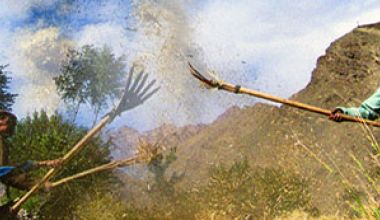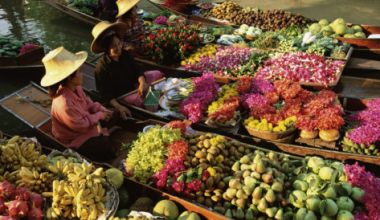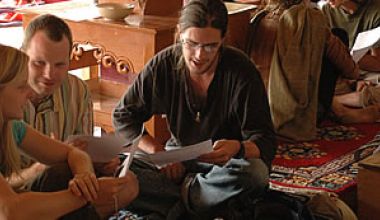Information
The Swedish woman Helena Norberg-Hodge, the founder of ISEC, was one of the first visitors from the western world to come to Ladhak, in the 1970s. She learned the language and got to know the lifestyle of the completely intact culture and the kindness of the natives. In the following years she watched the destructive power of tourism and the western developments take their course and became a strong critic of the consumer society. In 1978, she founded the Ladakh-Project, an association of Ladakhis and People from the West who demonstrate and support the path of a “gentle development” using adequate solar technology and organising regional agriculture, education and health projects.
“What changed my way of thinking was the joy about living, which I found everywhere in Ladakh”, says Helene Norberg-Hodge. “ First I thought that Ladakhis do smile a lot but under their smile there must be jealousy, anger and frustration. But after a few years I realised that their laughter comes from deep down, filled with peace and contentment. The change that came was dramatic: Once the Ladakhis where set out to foreign influence and modernisation, they developed the same signs of depression, agitation, anger and aggression as we experience it in the west. The fact that individuals and therefore an entire society will change under the pressure of new technologies, economies, education was the proof for me, that people can be dramatically influenced by social pressure.”
Short Description and Facts
| Members/Size: | large | Email: | infouk@isec.org.uk |
| Foundation Date: | 1978 | Webseite: | ISEC |
| Address: | PO Box 239 | Phone: | UK Tel: (01803) 868650 |
| TQ9 5RUTotnes | Fax: |
Arbeitet an den folgenden Globalen Herausforderungen
Since 1975, ISEC has been providing Ladakhi leaders with information about the impact of conventional development in other parts of the world while exploring more sustainable patterns of development in Ladakh itself, based on the use of local resources and indigenous knowledge.

The globalisation of the food economy, while enriching a small number of giant 'agribusinesses', is undermining the welfare of everyone else. What's more, it is a major contributor to increasing CO2 emissions, and therefore to climate change. ISEC's Local Food Programme aims to raise public awareness of these issues, in order to lay the foundations for community action and political change.

ISEC is pleased to offer our ground-breaking Roots of Change curriculum and study circle program. The curriculum, comprising voices of leading political, economic and ecological thinkers from around the world, lays out both how we've arrived at our present predicament and what we can do about it. The emphasis is on education for action: moving beyond single issues to look at the more fundamental influences that shape our lives. No academic background is required.



